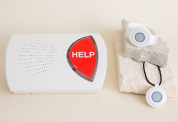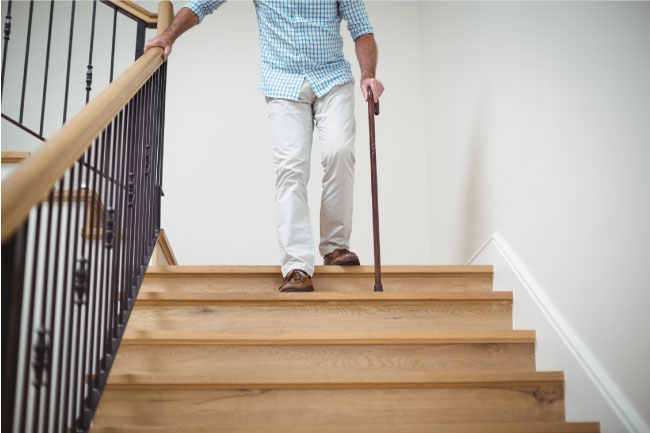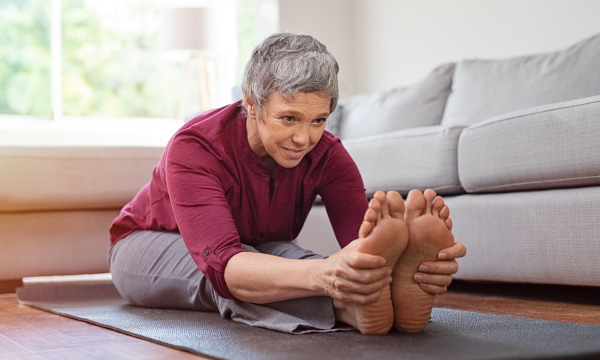The Importance of Keeping Your Balance as You Age
September 15, 2021
Loss of balance is a gradual process that often begins in your 40s and 50s. At first, the changes are subtle and people compensate – often without consciously realizing it. But by age 65, many adults are at risk from dangerous falls that may compromise their independence – or even take their lives.
The total senior population is rising as the Boomers age, but the rate of fatal falls in seniors is rising much faster. Between 2000 and 2016, the death rate from falls for seniors age 75 and up increased 300%.
Each September, the Vestibular Disorders Association promotes “Balance Awareness Week” to educate the public about balance issues in general and vestibular (inner ear) conditions in particular. It’s important to be aware of the most common causes of balance problems so you can take steps to protect/improve balance and stability as you age.
Common Health Conditions That Affect Balance

Many seniors develop age-related chronic conditions and health problems that affect balance and stability. Loss of balance is sometimes the first symptom of an underlying health problem.
- Medication interactions: Dizziness is a side effect of some common medications like anti-seizure drugs, antidepressants, sedatives, and tranquilizers. Make sure your doctors and pharmacist know about all the drugs you’re taking. Discuss the possible side effects of any new prescriptions.
- Blood pressure fluctuations: When you sit for a long period, blood tends to pool in your legs and lower body. If you stand quickly, the heart has to work harder to move the blood back to the upper part of the body, and older hearts are usually not as efficient. This is called “orthostatic hypotension,” and can be a warning sign of heart disease. Be sure to discuss it with your doctor.
- Low blood sugar: Over a quarter of seniors have diabetes. Dizziness is a symptom of sudden insulin drop. Talk with your doctor about any unexplained dizzy spells; you may need a diabetes screening.
- Inner ear problems: As we age, the cells in the vestibular system begin to die off, which affects a person’s ability to automatically correct their position.
- Impaired vision: It’s easy to trip over things you can’t see. Everyone should get an annual vision exam, and seniors in particular, need regular glaucoma and cataract screenings.
- Stiff joints and/or poor muscle tone: More than 30 million adults have some type of osteoarthritis. It’s usually caused by overuse of specific joints or just normal “wear and tear” as part of aging. The pain makes people less likely to move the joint, which leads to muscle weakness and unsteadiness.
Do You Need a Comprehensive Fall Assessment Screening?
Don’t just assume that poor balance is a “normal” part of aging. Talk with your doctor about a Comprehensive Fall Assessment screening to assess your fall risk if you can answer “yes” to any of these three questions:
- Have you fallen in the past year?
- Do you feel unsteady when walking or standing?
- Are you afraid of falling?
You can receive this screening as part of your initial “Welcome to Medicare” preventive visit or during subsequent annual Medicare wellness visits. Ask your doctor to help you create a personalized plan that identifies your fall risk factors and develops a strategy to mitigate them.
If you’re concerned that you or a loved one may be at risk of falls, consider a home medical alert with automatic fall detection. If you’re unable to push a button to call for help after a fall, the system calls for you. We offer affordable systems that protect you at home or on the go.
Exercise can Help Improve Balance
Talk with your doctor before beginning an exercise program and look for a senior-friendly gym or fitness center. Supervised classes geared towards your fitness level are great way to start becoming more healthy and active. Senior-friendly facilities have personal trainers and instructors who understand the needs of older adults and can help create personalized fitness plans.
Walking is one of the best exercises for seniors because it’s free, doesn’t require special equipment, and it helps to strengthen your lower body and cardiovascular system. Even so, regular walkers should also consider adding strength/resistance training and balance exercises. Both help you become stronger and more aware of your body’s position and movements.
Yoga and Tai Chi are especially beneficial for older adults. They’re low-impact and complement each other. Yoga practice can help you improve strength, flexibility, and balance. Tai Chi is a mind-body practice that improves balance, coordination, and stability. If you can’t access local, in-person classes, there are also online classes developed specifically for seniors.
Balance is something we don’t think about – until we lose it. Don’t be a statistic. Talk with your doctor about lifestyle changes that will help you stay health, upright, and independent.








